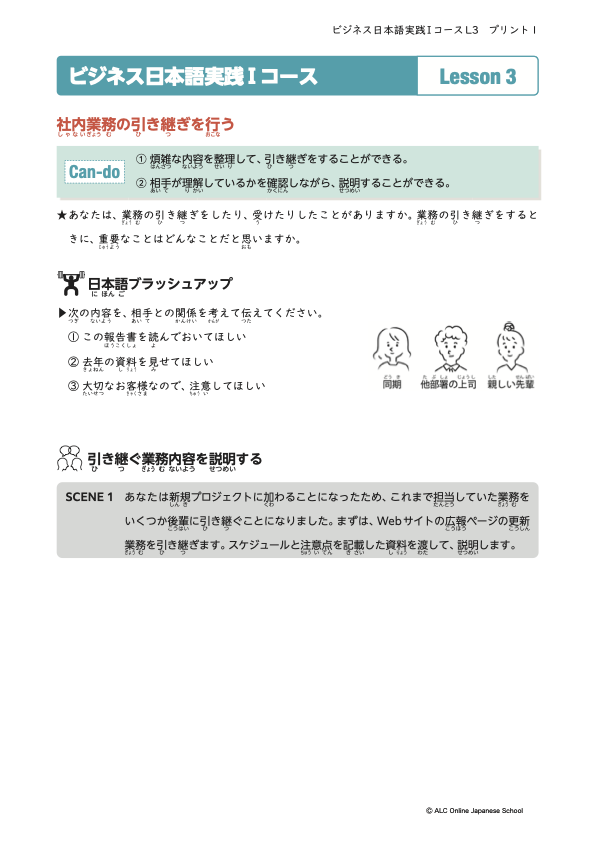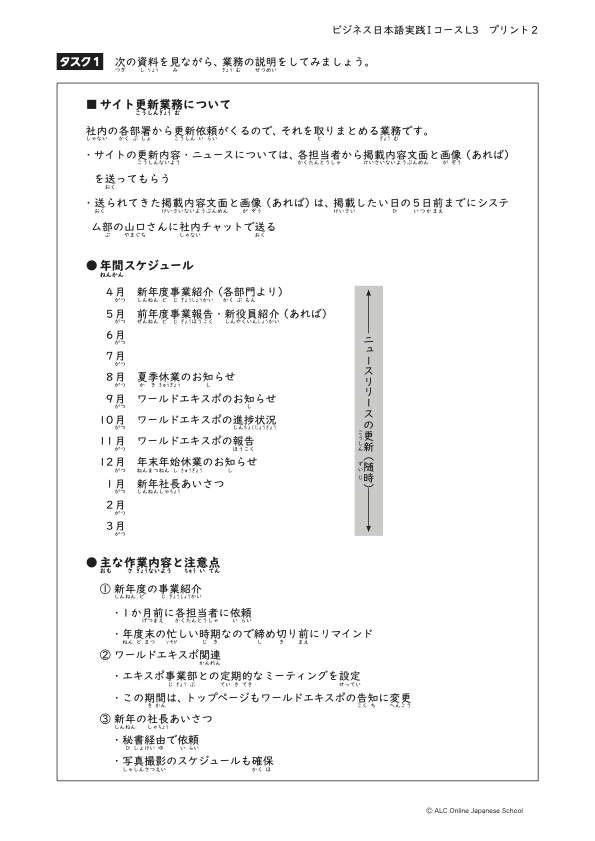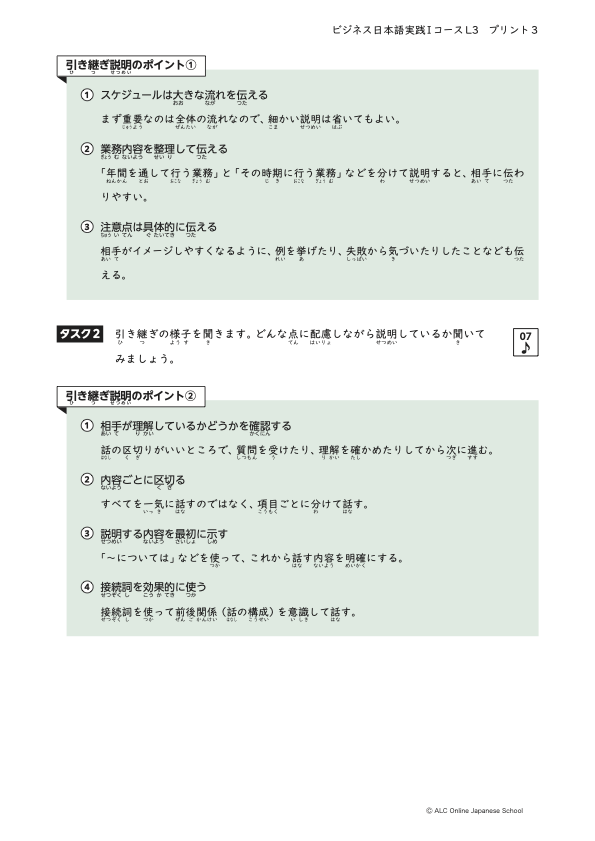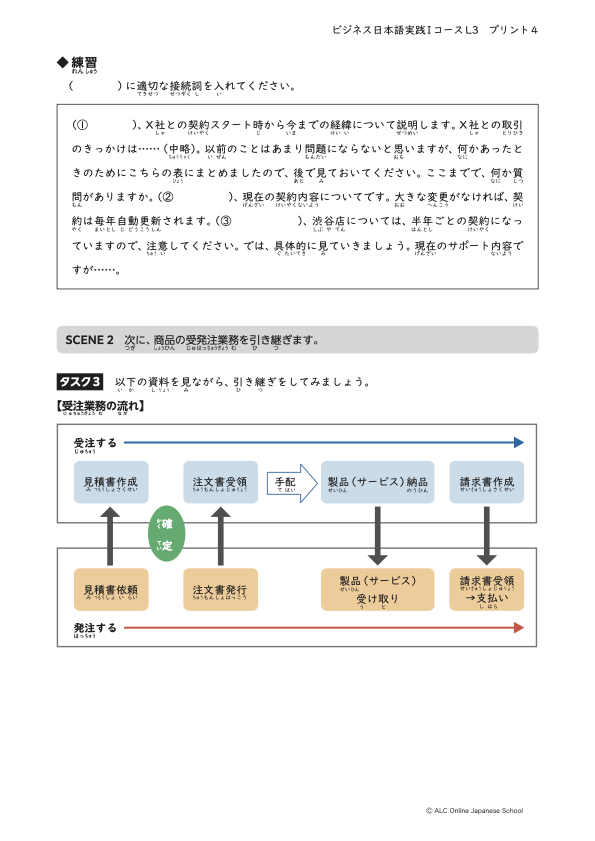About the courses
- Home
- Course List
- Practical Business Japanese Course I
Practical Business Japanese Course I
- Level of lesson
- Advanced
- (Japanese Language Proficiency Test N1 or higher)
- Ten 50-minute lessons
This practical course is designed for those who have about three years of work experience in a Japanese company. The goal of this course is for students to be able to use more sophisticated Japanese expressions in their daily work in the company while taking actions that are considerate of others in situations such as internal and external coordination and negotiation. Students will also learn about idiomatic phrases commonly used in business situations and formal expressions appropriate for the occasion to improve their Japanese language skills.
| Lesson | Topic | Objective |
|---|---|---|
| 1 | Asking questions at internal meetings | Confirm and understand the main points about the contents of regular internal meetings. Also, learn how to express questions about unclear points of the meeting content according to the situation. |
| 2 | Taking minutes of internal meetings | Confirm the contents required for the minutes, and learn how to take minutes by confirming conclusions and ambiguous points. |
| 3 | Handing off business | Learn how to explain handing off internal work by organizing complicated details so that the other party can easily understand them, and how to explain while confirming the other party's level of understanding. |
| 4 | Convening and moderating meetings | Learn how to write emails to adjust the schedule of internal meetings. Also, learn the flow and expressions of chairing a meeting. |
| 5 | Reporting research and analysis | Learn how to explain the results and analysis of a survey in an easy-to-understand manner, and how to explain and express yourself in a persuasive manner. |
| 6 | Conducting internal hearings | In order to facilitate business operations, think about asking for cooperation ("nemawashi", consensus building) from related parties and learn how to write consultation emails. Also, learn tips and expressions for eliciting responses from others regarding hearings. |
| 7 | Making a presentation at an online meeting | Participate in an online meeting outside of the company, confirm points to keep in mind when giving a presentation, and learn how to answer using appropriate expressions during the Q&A session after the presentation. |
| 8 | Responding to trouble | Learn how to report and consult with your supervisor in an organized manner when a problem arises. Also, learn expressions for making complaints and polite apologies and suggestions when receiving complaints, while giving consideration to customers and business partners. |
| 9 | Introducing the company's products and services | Think about how to talk to people you meet for the first time at exhibitions and how to end a conversation. Learn how to explain the strengths and differences of your company's products and services from those of other companies in an easy-to-understand manner and using related expressions. |
| 10 | Confirmation test and review | Take a confirmation test (about 10 questions) of the course contents and review the course. |
The content and progression may be subject to change.
Teaching materials and lesson procedures
Each lesson consists of several printouts, which are followed by the lesson. After confirming the objectives for the lesson with the instructor, students will learn idiomatic phrases and expressions based on the theme of the lesson in the "Japanese Brush-Up" section. After that, they will learn more sophisticated expressions for role-plays, writing emails, and presenting the results of analysis of the main theme. At the end of the course, students will take a short test to check their mastery of the course content.
Three features of the course
-
Practical content can be learned
Students will learn practical Japanese expressions essential in business situations, such as asking questions at regular company meetings, taking minutes, scheduling meetings, handling complaints, and explaining products and services to customers. -
More sophisticated Japanese can be learned
In addition to idiomatic phrases and small expressions commonly used in business situations, students will learn more advanced and sophisticated Japanese expressions, such as expressions that should be used differently depending on the relationship with the other party. -
Students can reflect on their own use of Japanese through output
All lessons are output-oriented. Through role-plays and task reviews, students can brush up on their Japanese language skills by reflecting on small mistakes and unknown expressions that are often overlooked in daily life.








